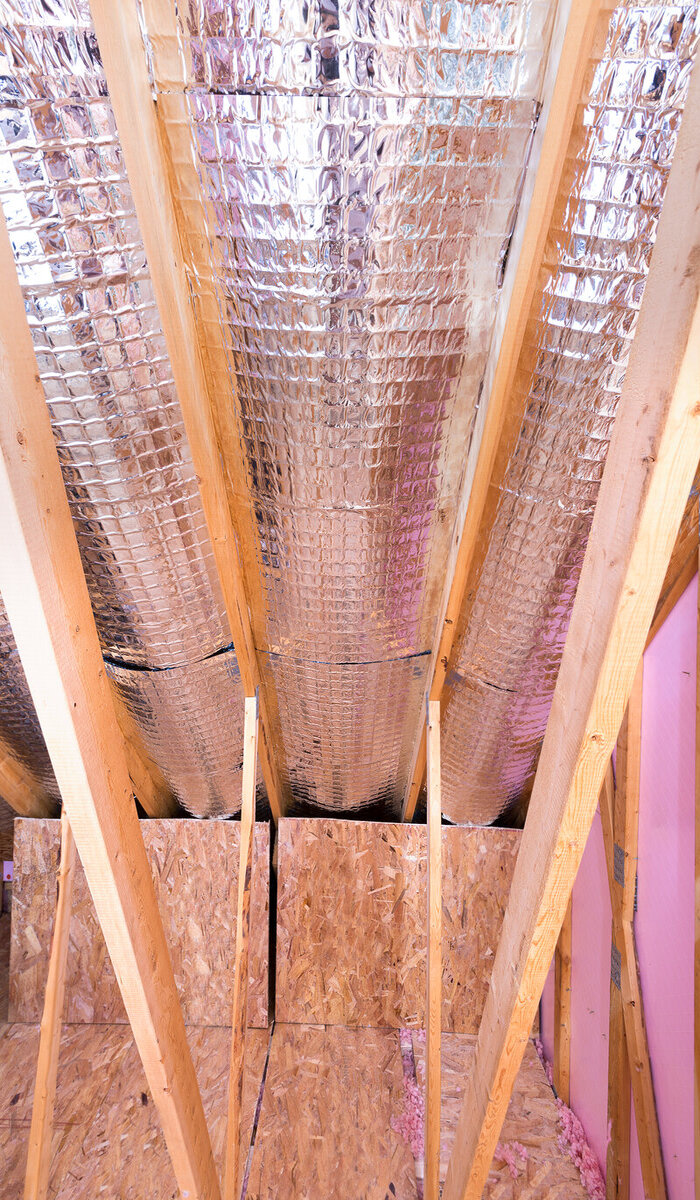
Solar heat gain is the leading source of your cooling bills, most of which transfers from the roof to the attic and into the home’s interior spaces. Radiant barriers installed in the attic reduce this heat gain, creating a more energy-efficient - and cost-efficient - home.
Radiant heat travels from one source to another. For example, a wood-burning fireplace radiates heat through the exterior to the surrounding space. Or, a coffee mug radiates heat from the coffee into your hand. Roofing materials absorb the sun’s rays. Depending on your roof materials’ reflective or cooling properties, this heat radiates through the roof deck and into the attic.
Not all homes benefit from a radiant barrier in the attic, so an inspection with a licensed and experienced roofer or insulation contractor is the best way to determine whether the investment will pay for itself over time. In most cases, Bay Area homes save enough on cooling costs that it pays for itself in less than 10 years - especially if your home is in a sun-exposed location.
On a hot summer day, Bay Area attics register temperatures as high as 125 degrees, especially if you have a dark, asphalt shingle roof without reflective treatments. Radiant barriers do just that. The foil-lined barrier redirects the heat away from the interior space and back up - or out - toward the roof and exterior walls.
A radiant barrier may not benefit you if you live in a shadier or cooler spot. Expert opinions are needed to keep you from spending unnecessarily. Sometimes, we’re called out to evaluate whether a home would benefit from radiant barrier installation but wind up recommending increased thermal insulation instead. In cool climates - or locations - minimizing heating costs and keeping your home warmer on cooler days makes more sense.
You'll reap five key benefits once your radiant barrier is in place.
Most Americans spend 50% or more of their utility bills on heating and cooling costs. Here in the Bay Area, most of that expense is spent on cooling via air conditioning. Installing radiant barriers as needed reduces the amount of time the AC runs, notably reducing total cooling costs. The savings don’t stop there.
When it’s time to replace your HVAC system, ask the technician to run new Manual J calculations and let them know you’ve recently installed a radiant barrier in the attic. These calculations determine the system size best suited to your home. According to the Department of Energy, “Some studies show that radiant barriers can reduce cooling costs 5% to 10% when used in a warm, sunny climate.
The reduced heat gain may even allow for a smaller air conditioning system.” A smaller system costs less, which could save you hundreds, if not thousands, of dollars. Also, the less the AC has to run, the less maintenance is required, saving you unnecessary repair and replacement bills.
The less you need to use your AC, the less energy you consume. This results in overall whole-home energy efficiency. Home energy efficiency should always be a priority. However, if you have solar panels - radiant barriers are worth having if you need them. The more energy you save, the less you’ll have to buy back from the grid.
Finally, you’ll notice a difference in the comfort consistency from room to room. This is especially true for the upper rooms in a multi-story home. The closer the room is to the attic, the more heat transfer occurs. Once your radiant barrier is in place, there is less heat transfer to the lower living spaces, leading to more consistent and comfortable temperature.
This prevents things like hotter upstairs and cooler downstairs spaces or drafty areas. If you have a zoned HVAC system, consistent temperatures reduce the amount of time a historically “warmer zone” has to be cooled.
Reduced condensation leading to greater moisture control is another benefit of adding a radiant heat barrier if you need one. While the days may be warm or hot, our Bay Area evenings are typically cool. Without adequate attic insulation and ventilation, fluctuating attic temperatures between hot-by-day and cool-by-night lead to condensation. Over time, condensation leads to moisture control and humidity issues, increasing your chances of developing mold/mildew in the attic or interior wall spaces.
Are you planning to convert the attic into a habitable living space? If so, and your attic or upper stories tend toward the warm side, a radiant barrier is a must. Once installed, the converted space will be far more comfortable year-round. We always recommend scheduling an attic inspection before converting your attic. The more you do beforehand to prep the space, the better the overall conversion will be in terms of cleanliness, sanitation, safety, and comfort.
Are you curious to learn more about radiant barriers and whether installing one would improve your attic function? If so, schedule an inspection with Attic Solutions. We’re the Bay Area’s trusted, go-to attic pros. We never upsell or push any products. We provide honest, accurate information and respect our client’s choices.